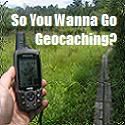Geocaching: It's the Trip, Not the Trove
March 31, 2009 7:22AM
Geocaching doesn't attract the rogue and huckster gold-diggers of yore. And despite the early participation of some culty tech people, after nearly a decade geocaching is now a pleasant avocation largely for good kids, moms and retirees, with associations found around the world. This loose confederacy of geocachers has a Boy Scouts vibe.
Americans have a history of believing in oracles that tell them to dig. Where I grew up, not far from the American Society of Dowsers in Danville, Vermont, even skeptical farmers consulted dowsers to help them decide where wells should go.
Before he discovered Mormonism, Joseph Smith was a "money digger" who trusted that a stone in a hat, properly viewed, could lead him to buried treasure; when the stone pointed the way to a hill in New York that contained the Book of Mormon, he hit the mother lode.
California, of course, was settled in part by men who felt called to go gold-digging. And in this century, with perhaps less riding on their hunches than Smith or the forty-niners, a growing clique of hobbyists who started in Oregon nine years ago have combined G.P.S. satellite technology and social networking in a curious pastime called geocaching.
Geocaching is a kind of global treasure hunt. It has a number of advantages over dowsing or other Luddite methods for finding hidden stuff. First, geocaching is undertaken just for fun. Second, someone has always deliberately buried the treasure (or "cache"), noted its coordinates (usually someplace outdoors) and supplied facts about it online.
Finally, players use no magic rods, enchanted sticks or seer stones to find their caches: They use G.P.S. devices. That must take some of the witchcraft out.
It's mysterious nonetheless: What's the allure? The treasure has been planted, after all, by people so good as to signal when the surrounding terrain is not wheelchair-accessible -- so where's the suspense? What's more, it's almost a certainty that the treasures in geocaching will be nearly worthless.
You might turn up a logbook that you can read and sign; or Geocoins, which are the Monopoly money of geocaching; or some old golf balls or coupons, the esoteric trophies of the sport. But there is never gold. Food is discouraged because it rots and draws bears.
Paul Sookiasian, a recent college graduate who lives in Pennsylvania, has become an ardent cacher in the past year. He has turned up about 70 caches so far. "What drew me to geocaching was the little bit of mystery it puts into everyday existence," he explained in an e-mail message. "It's kind of fun (in a nerdy way) to go by these places with the knowledge that something interesting is there that everyone else around you doesn't realize. Maybe there's a little fascination in us left over from childhood of hiding little treasures in secret places."
That seems about right. Thor Muller, a Web entrepreneur in San Francisco, takes his 7-year-old son on geocaching adventures. Mr. Muller seems like a busy man; why go hunting for worthless trinkets? "You discover places you had no idea existed," he told me.
"Recently, we were out looking for a cache on Russian Hill. There are breathtaking views of San Francisco. But we couldn't find this thing anywhere. Finally my wife kicked a stone, and it turned out to be hollow. The treasure was inside." A great day. Sort of: When they went through the treasure, Mr. Muller said, "it was just junk. I think my son cried a little bit."
And then there are virtual caches. "The reward for these caches is the location itself" is how the Geocaching site explains them. They're just nothings, then -- an instruction to go somewhere for the sake of it. Virtual caches are no longer allowed on the site, but some older ones have been grandfathered in.
Geocaching, in spite of its superficial mystery, has to be among the least ominous epiphenomena of the Internet. It's a sweet and highly organized way to make ordinary vistas surprising, and it seems to speak to the better angels of the Internet's nature.
Sometimes the Internet is its own place -- a blown-out fantasia that exists independent of the world of rocks, soil, flesh and blood. At other times, it seems not like a pyrotechnic cloud above us but like an earnest guestbook for life on Earth, filled with entries that say little more than "I was here and it was beautiful." Or "I was here and it was weird." When you're feeling open to these sentiments, they're each surprisingly moving.








No comments:
Post a Comment